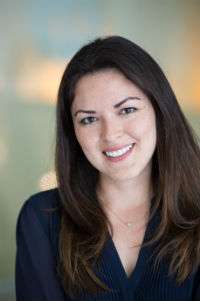
Q&A: Mila Neyra
April 18, 2018
For Bloomberg Fellow Mila Neyra, getting people to eat their veggies is about more than nutrition or health. It’s about justice.
Neyra, a Latina immigrant from Peru, came to the Initiative from the diabetes program at the Institute for Family Health, a federally qualified community health center in New York. There, she worked with many patients who have limited access to the healthy foods that could help them manage their condition. Now in the Johns Hopkins Bloomberg School of Public Health full-time Master of Public Health program with a focus on obesity and the food system, Neyra hopes to return to New York with the skills and knowledge to help Institute for Family Health patients thrive.
We talked to Neyra about how she became interested in nutrition and obesity prevention, how learning to make salad can change someone’s life, and what’s next after she finishes her coursework.
Have you always been interested in nutrition?
Yes, but it wasn’t a straight path.
When I was in AmeriCorps, I ran a school garden and I brought in vegetables during a lunch workshop to promote it. I remember a kid grabbing the cucumber saying, “I’ve never seen this before!”
Later, as a health coach, I met patients who were dealing with diabetes and financial instability, housing issues or mental health problems. Those experiences inspired me to get more skills, so I could do more for them. I came here, to Johns Hopkins, to get those skills so I can develop and manage programs that focus on obesity prevention, food security, and health equity.
You need food to be healthy, to survive. I see many people who don’t have access to food or cannot afford it. That drives me to make justice.
What sort of work did you do at the Institute for Family Health before starting the fellowship program?
When I started at the Institute, a lot of my job was about nutrition counseling and connecting patients with available resources.
One of my favorite parts was our shared medical visit program. Patients with diabetes would come in a group once a week for eight weeks to meet with a doctor, a diabetes educator and a health coach, like me.
The patients loved it. They would check-in with their doctor and then we’d have a group discussion of diabetes self-management topics and medication management. We’d also incorporate a short physical activity session, cooking demos, and goal setting exercises.
One day, a patient asked if we could have a session on how to make a salad. Months later, after she graduated from the program, I saw her at the farmers market in Union Square buying all sorts of fresh veggies. That was such a highlight for me. Before she didn’t even know how to make a salad and now she’s buying kale.
You’re in the full time Master of Public Health program. What’s that been like?
My classes are giving me the skills I need. Last semester, I took Introduction to Food Systems and this semester I’m taking the Baltimore Food Systems Case Study class. It’s focused on Baltimore, but the things I’m learning also apply to New York. And the Program Planning and Program Evaluation classes are a perfect fit. These classes set the blueprint for leadership building, particularly in program management.
What are your plans after you finish your coursework?
I’m returning to the Institute for Family Health. As part of the master’s, we have to complete a practicum and a capstone. For the practicum, I’m developing an obesity prevention program for adolescents in the Bronx, which has one of the highest obesity rates in New York. This project will utilize an evidence-based approach to prevent and reduce obesity among adolescents in primarily Black/African American and Latino communities. For my capstone, I’ll be writing the process of how I developed it. I’m excited to get going.
Connect With Us
Receive all the latest news from the Initiative by signing up for the American Health Dispatch newsletter, subscribing to the American Health Podcast, and subscribing to our YouTube channel.
Contact Us